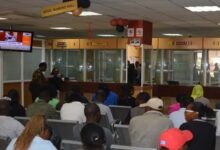Untold: Tech-startups in Northern Kenya

Tech innovations, either self-generated or initiated from outside the suburbs of Kenya, are central to the development of many counties, and such a case is Garissa and Marsabit local hubs by Nairobi iHubs. In ‘an era of unprecedented technological innovation and evolving user expectations and information-seeking behaviour, we are arguably now an online society, with digital services increasingly common and increasingly preferred’ (Buchanan, 2010; see also Castelli, 2006).
In Feb 2018, the Nairobi iHub had partnered with Adeso and Mastercard Labs to set up innovation labs in Marsabit and Garissa, known as the Maarifa Kona Innovation Labs. After selecting 40, 20 from each Lab, to take part in a selection process, 22 were selected to take part in a programme that featured training, mentoring, coaching and support in three phases — Idea Generation and Selection, Research and Concepts, and Development. (Disrupt Africa report)
In Marsabit, the local hub located in Catholic Mission compound representing the area are the Mt. Marsabit Women Dairy Group, climate advisory service Climate Information Pastoral Unit, warehouse rental solution When The Sun Shines, and feeds manufacturer Drought Cure. The four from Garissa are milk safety solution Frontier Camel Milk Enterprise, flour manufacturing company Mathenge Maisha, greenhouse tech solution Smart GreenHouse, and the Maisha Dada Women Empowerment Centre. Funded through UKAid and managed collaboratively by the Communicating with Disaster Affected Communities (CDAC) and Start Network, the programme has been accepting applications for support from local businesses. In the incubation phase, the eight innovations refined their business and financial models, got their legal structures in place, and receive training in things like investment readiness, theory of change, ethics, leadership, sales and marketing
One successful story shared by StartNetwork is The Mt. Marsabit Dairy a women’s cooperative diary in Marsabit County, northern Kenya that sources dairy products from individual suppliers and applies cutting-edge production techniques to offer longer life, affordable dairy products. The dairy supports the most vulnerable members of the community, especially pastoralist women, to earn a livelihood through a structured micro-milk collection system. These suppliers are most at risk and commonly excluded from dairy markets. The dairy supports the most vulnerable members of the community, especially pastoralist women, to earn a livelihood through a structured micro-milk collection system. These suppliers are most at risk and commonly excluded from dairy markets.
According to start Network the situation in Marsabit County for small dairy suppliers is precarious. It is what motivated a group of women from Karare to come together to devise a more efficient way to sell their dairy products, and so Mt Marsabit Women’s Dairy came into existence. The social enterprise seeks to support the most vulnerable members of communities, especially pastoralist women, to generate an income through a structured micro milk collection system. The positive output from the startup has led to Mt Marsabit’s reputation and customer base is growing. The business has expanded and now offers ghee and yoghurt products, as well as fresh milk.
The team has received support from the Kenya Agricultural Livestock and Research Organization in the form of training, a ghee-making machine and a milk depot, a permanent stone building. The International Institute of Rural Reconstruction has committed to covering 70 per cent of the total cost of refrigerated storage needed to upscale current production. Mt Marsabit Women’s Dairy sought in 2019 an investment of GBP 15,500 over 18 months to scale the business and reach different markets within Marsabit County. The investment was to support processing, packaging and branding, market research, establishing ICT systems and expanding the business’ distribution model.
In conclusion technological innovations play an increasingly prominent role in the growth of previously marginalised counties. As a result, governments are shifting their attention from science and technology policy to a focus on research and innovation policy. Models of the innovation process have evolved over time and are now able to take into account the many factors outside the firm that affect the ability to innovate and the rewards from it.
Innovation is a socio-economic process that leads to the observed exponential growth in value or performance of high priority capabilities. The divergence of innovative capacity in different societies can be understood in terms of social capital and public policy. National systems of innovation reflect these differences.
Follow us on Telegram, Twitter, Facebook, or subscribe to our weekly newsletter to ensure you don’t miss out on any future updates.



